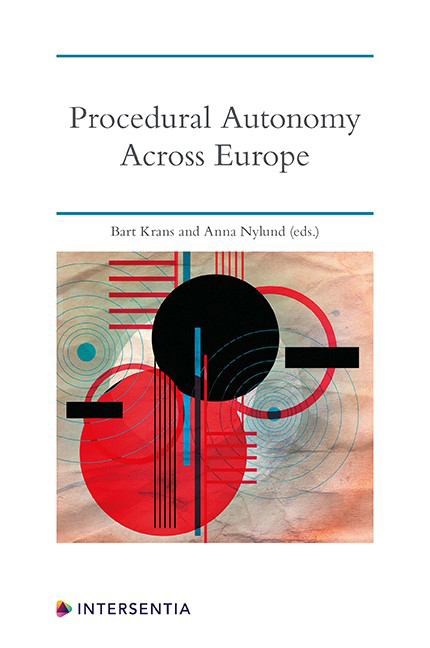Book contents
- Frontmatter
- Preface
- Contents
- Table of Cases
- List of Authors
- Aspects of Procedural Autonomy
- Procedural Autonomy and Belgian Civil Procedure Law: A Turbulent Cohabitation
- The English Approach to Procedural Autonomy
- The Finnish Way of Understanding Procedural Autonomy: A Practical Approach to Implementing EU Civil Procedural Law
- A German Perspective on the Waning Procedural Autonomy in Civil Matters: Who is Afraid of European Civil Procedure?
- Procedural Autonomy in the Netherlands: A Fading Relic?
- Procedural Autonomy, the EEA Agreement and Norwegian Law: The Art of Bridging a Gap and Maintaining it Too
- A Polish Perspective on Collective Civil Proceedings: Reluctance to Follow EU Recommendations?
- Procedural Autonomy between EU Law and the Slovenian Law of Civil Procedure
- Autonomy of the Spanish Legislator in the Regulation of Procedural Law: The Borders of European Case Law
- Procedural Autonomy in Sweden: Is Materielle Prozessleitung the Answer?
- Comparative Insights on Procedural Autonomy
- Index
- ABOUT THE EDITORS
Autonomy of the Spanish Legislator in the Regulation of Procedural Law: The Borders of European Case Law
Published online by Cambridge University Press: 30 April 2020
- Frontmatter
- Preface
- Contents
- Table of Cases
- List of Authors
- Aspects of Procedural Autonomy
- Procedural Autonomy and Belgian Civil Procedure Law: A Turbulent Cohabitation
- The English Approach to Procedural Autonomy
- The Finnish Way of Understanding Procedural Autonomy: A Practical Approach to Implementing EU Civil Procedural Law
- A German Perspective on the Waning Procedural Autonomy in Civil Matters: Who is Afraid of European Civil Procedure?
- Procedural Autonomy in the Netherlands: A Fading Relic?
- Procedural Autonomy, the EEA Agreement and Norwegian Law: The Art of Bridging a Gap and Maintaining it Too
- A Polish Perspective on Collective Civil Proceedings: Reluctance to Follow EU Recommendations?
- Procedural Autonomy between EU Law and the Slovenian Law of Civil Procedure
- Autonomy of the Spanish Legislator in the Regulation of Procedural Law: The Borders of European Case Law
- Procedural Autonomy in Sweden: Is Materielle Prozessleitung the Answer?
- Comparative Insights on Procedural Autonomy
- Index
- ABOUT THE EDITORS
Summary
‘Procedural autonomy’ of the Member States does not exist in a sense that could be understood before the creation of the European Communities, i.e. sovereignty. In the framework of the current EU it is impossible to conceive that States enjoy full freedom to legislate in any area, not only the procedural one, because their conventional commitment to the implementation of European law prevents a national legislator from issuing its norms as if that law did not exist. The commitment of the States is with all the institutions of the EU, and also with the European Court of Justice.
Assuming this situation, rather than ‘procedural autonomy’ (a very ambiguous expression), freedom of procedural regulation conditioned by European law could be a better description. Therefore, national norms cannot prevent the implementation of European law. The most relevant question, however, is not trying to mark the borders of both legislations, but rather those of the Court of Justice at the time of conditioning, with its case law, this national freedom of regulation mentioned before.
Despite this conclusion, the work of the European Court of Justice may not have really tangible limits. So far it has usually tried to relate its decisions in this regard with the protection of the rights of citizens, especially those in a more sensitive position. In addition, its task up to now has been to declare the inapplicability of national norms, and not to create others in order to take their place. Even in relation to the controversy about the acts of the judge on his/her own motion, the ECJ has acted this way as well, although sometimes it was apparently not the case.
However, obviously there is a lack of better predictability of the decisions of the ECJ, clarifying the sectors in which it will intervene. But this predictability is hardly conceivable since all legal orders – including the European one – are essentially evolutionary. Therefore, the possibility of establishing some basic procedural rules for the entire EU could guarantee greater legal security.
In Spain there have not been many situations in which the concept of procedural autonomy has opened an important debate. The only remarkable situation was ex officio control of unfair character of contractual terms, claimed by the ECJ, which did not exist in Spanish law and forced an important legal reform.
- Type
- Chapter
- Information
- Procedural Autonomy Across Europe , pp. 183 - 202Publisher: IntersentiaPrint publication year: 2020
- 1
- Cited by



